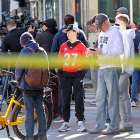
Two years ago, the NCAA considered eliminating the rule against in-person scouting of future opponents because of its "minimal competitive advantage." While a proposal reviewed by the NCAA Council in November 2021 was soundly voted down, it provides context as to how some members of the association viewed in-person scouting at the time -- this as the NCAA investigation into Michigan's alleged sign stealing continues.
The proposal brought forth by a subcommittee of the NCAA Division I Legislative Committee. The goal was to modernize rules that "no longer serve the needs of the membership and the 21st century student-athlete."
Michigan briefly referred to the proposal in a 10-page letter sent to the Big Ten on Nov. 4. That letter contested Big Ten commissioner Tony Petitti's jurisdiction in punishing the program.
However, that proposal was only supported by 12 of the 32 Division I conferences, CBS Sports has learned. The Big Ten was among the leagues that voted against the proposal. The Big East was the only power conference to vote for it.
The NCAA Council is responsible for day to day decision making within Division I.
The proposal sought amend Bylaw 11.6, which has been in effect since 1994 and is at the center of the Michigan sign-stealing investigation. The bylaw prohibits off-campus, in-person scouting of future opponents. It was originally adopted as a cost-saving measure. Part of the rationale of amending the bylaw relied on the widespread availability of game film to scout opponents.
Several coaching sources confirmed to CBS Sports that they can figure out an opponent's signs to signal in plays from game film without in-person scouting of future opponents. That is allowed under NCAA rules. Michigan is being investigated for what the Big Ten claims was an elaborate scouting scheme to steal signs.
In the NCAA's weighted voting procedure that gives more influence to power conferences, the final tally was 48-14 against the proposal with less than one quarter of parties voting to amend the bylaw.
One of the rationales for the proposal stated that "minimal competitive advantage" was "outweighed by the monitoring and enforcement burdens" of adhering to the bylaw.
NCAA enforcement is vigorously investigating allegations that former Michigan staffer Connor Stalions improperly scouted future opponents over a period of "multiple years."
The proposal was ultimately voted down Dec. 15, 2021. It's not clear how far back Michigan's alleged improper scouting scheme goes. Stalions resigned Nov. 3. Michigan sources told CBS Sports that Stalions would have been fired had he not resigned.

















